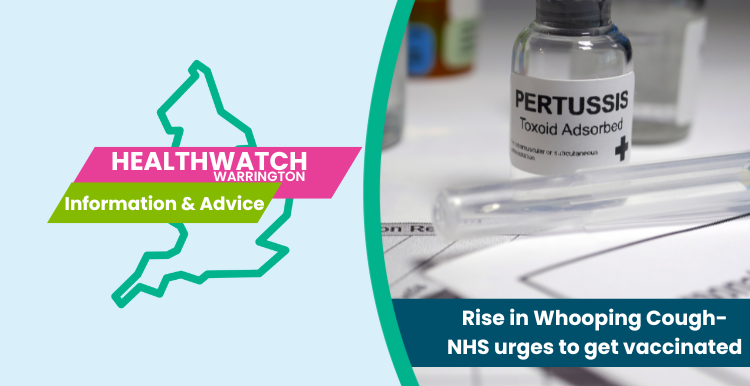Whooping Cough- What is it?

What is Whooping Cough?
Whooping cough (also known as Pertussis) is a highly infectious, serious infection caused by bacteria, which affects the lungs and the airways, causing long bouts of coughing and choking. The ‘whoop’ is caused by gasping for breath after each bout of coughing, making it hard to breathe, though babies do not always make this noise.
What are the Symptoms?
The first set of symptoms most people report is similar to those of the common cold: with a runny nose and a mild fever. A week or two later a cough develops. This cough could be quite severe at times with uncontrolled bouts of intense coughing that can last for minutes at a time and may sometimes cause vomiting. The cough is often worse at night time and may create a whooping sound as the individual gasps for breath.
When to seek urgent medical help?
- Your baby is under 6 months old and has symptoms of whooping cough
- You or your child have a very bad cough that is getting worse
- You've been in contact with someone with whooping cough and you're pregnant
- You or your child has been in contact with someone with whooping cough and have a weakened immune system
Ask for an urgent GP appointment or get help from NHS 111
Who is at risk?
New born babies are at the highest risk of becoming seriously unwell from whooping cough, causing them to become dehydrated, stop breathing at times and in severe instances pneumonia or seizures.
Babies are not the only ones at risk. Whooping cough can affect people of all ages which can be unpleasant and lead to other illnesses similar to those in newborns.
How to prevent contracting whooping cough?
Children and pregnant women:
The best way to prevent whooping cough is to get vaccinated. In the UK the vaccine is only offered to children.
The whooping cough vaccine is given as part of the routine childhood vaccination schedule in the UK. Babies receive three doses at 8, 12 and 16 weeks old (the 6-in-1 vaccine), followed by a booster at 3 years 4 months. This provides high levels of protection against severe disease.
It's also important for pregnant women to get vaccinated against whooping cough, ideally between 16 weeks up to 32 weeks in each pregnancy to maximise protection for you baby. Vaccinating pregnant women allows the protection to pass to their unborn baby in the womb so that babies are protected from birth in their first months of life, before they can receive their own vaccines from 8 weeks of age.
How to get protection?
Mums-to-be can contact their midwife or GP surgery if they have reached week 16 of their pregnancy and are unsure whether they have had the vaccine.
Parents can also help protect their children by ensuring they receive their vaccines at the right time or catching up as soon as possible if they have missed any. If you are not sure if your child has had all their routine vaccinations, check their personal health record (Red Book) or contact your GP practice.
Adults:
Practicing good hygiene to prevent the spread of the bacteria that cause whooping cough and other respiratory illnesses.
Preventing the spread of whooping cough:
- Cover your mouth and nose with a tissue when you cough or sneeze.
- Throw away used tissues in the waste basket right away.
- Cough or sneeze into your upper sleeve or elbow if you don’t have a tissue. Never cough into your hands because you can spread germs this way.
- Wash your hands often with soap and water and dry thoroughly.
- Use an alcohol-based hand sanitizer if soap and water are not available.


